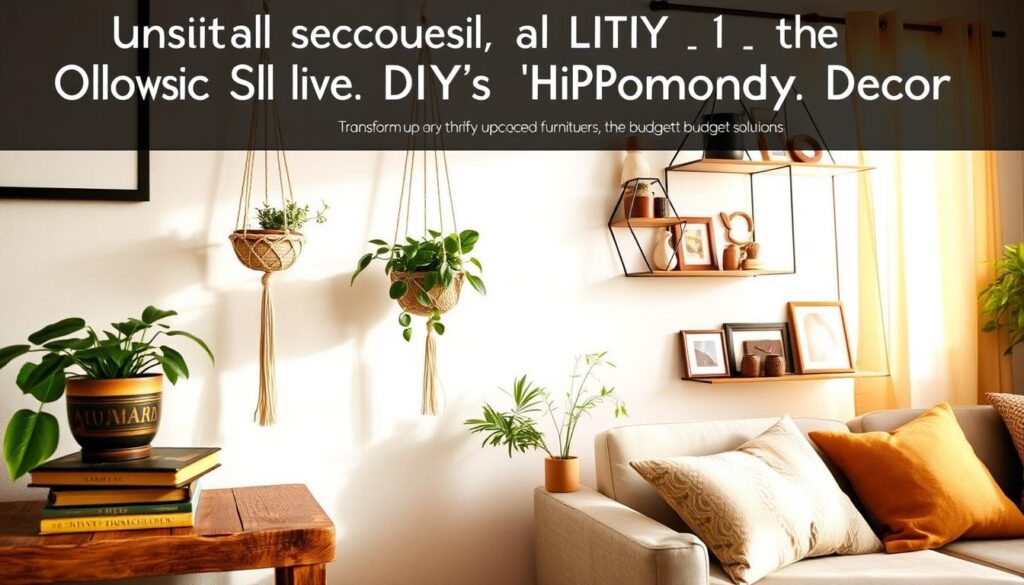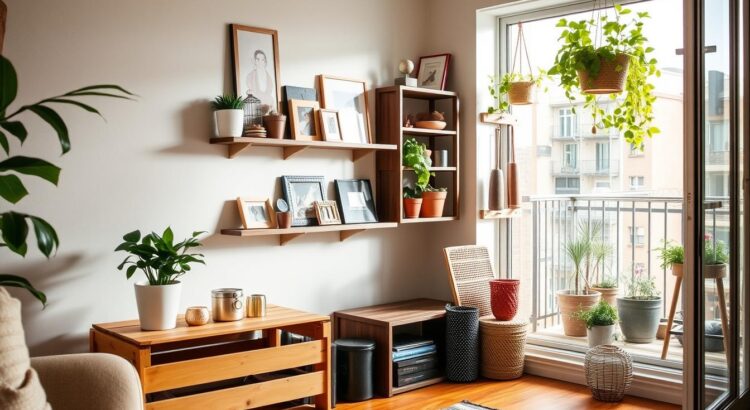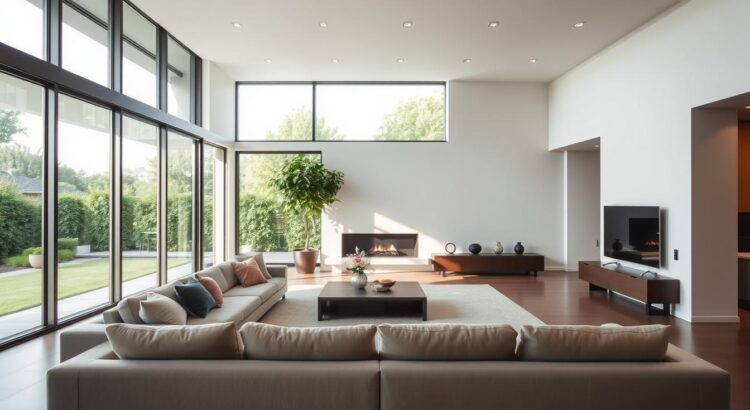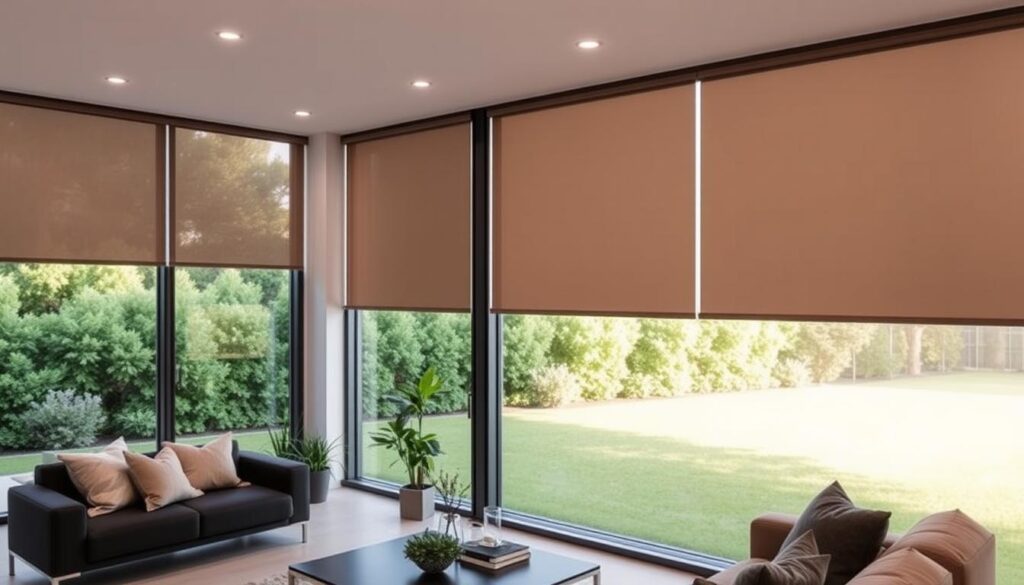Living in a small space can be tough. But, with the right DIY home projects, you can make it cozy and useful.
Small space living needs creativity and smart ideas. By using small space DIY ideas, you can use your space better. This makes it more cozy and nice to look at.
Experts from Family Handyman and The Home Depot say simple DIY projects help a lot. These projects make your small home better to live in. They also make it feel bigger and more welcoming.
Key Takeaways
- DIY projects can enhance the livability of small homes.
- Simple DIY ideas can make small spaces feel more spacious.
- Maximizing space with DIY projects improves functionality.
- Personalizing your space with DIY projects adds a welcoming touch.
- Experts from Family Handyman and The Home Depot offer valuable DIY insights.
Understanding the Challenges of Small Space Living
Starting to fix small space living is the first step. People in small homes often deal with not enough storage, clutter, and space not used well.
Common Problems in Small Homes
Small homes get cluttered, making them feel even tighter. Lack of storage is a big problem, causing mess. It’s hard to make useful areas in a small space.
- Limited storage capacity
- Inefficient use of space
- Clutter and disorganization
The Benefits of DIY Solutions
DIY projects are a smart fix for small space living. With creative home projects and small space DIY ideas, you can make your space better. DIY helps make spaces useful, adds storage, and makes small homes better to live in.
“The way you organize your space can significantly impact your productivity and overall well-being.”
DIY fixes can turn your small home into a better, more useful place.
Essential Tools and Materials for Small Space DIY Projects
Choosing the right tools and materials is key for small space DIY projects. In tight spaces, being efficient and careful with what you use is crucial.
Must-Have Tools for Small Home Projects
The right tools make a big difference in DIY projects. The Home Depot says you need a cordless drill, a level, and a tape measure. These tools help with many tasks, like hanging pictures or building furniture.
- A cordless drill for drilling and driving screws
- A level to ensure everything is perfectly horizontal or vertical
- A tape measure for accurate measurements
Space-Saving Materials to Consider
Choosing materials that save space is important. Family Handyman recommends plywood, MDF, and reclaimed wood. They are versatile and look good too.
Safety Considerations for DIY in Limited Spaces
Safety is always first when doing DIY projects, especially in small spaces. Make sure there’s good air, wear protective gear, and keep your area tidy. This helps avoid dangers.
Maximizing Vertical Space with Wall-Mounted Solutions
Small homes need to use vertical space well. Wall-mounted solutions are a smart way to do this. They make rooms look better and work better too.
DIY Floating Shelves for Extra Storage
Floating shelves add storage without taking up floor space. They’re great in kitchens and bedrooms. They can hold things you need or just look nice.
Simple Bracket Shelves
Simple bracket shelves are easy to put up. They fit any wall. They’re good for books, decorations, or kitchen tools.
Invisible Mounting Systems
Invisible mounting systems make things look neat and simple. They hide the brackets. This makes your space look clean and tidy.
Wall-Mounted Desks and Workstations
Wall-mounted desks save space in small homes. They fold up when not needed. This makes room for other things.
Vertical Garden Projects for Small Spaces
Vertical gardens are pretty and clean the air. They make a calm spot. You can use wall planters or trellises to make one.
Using wall-mounted solutions helps make the most of vertical space. This makes your home more organized, useful, and lovely.
Multi-Functional Furniture DIY Projects
You can make furniture that does more than one thing in your small home. This saves space and makes your home feel more like you. Multi-functional furniture is great because it does two or more things at once.
Convertible Coffee Tables with Storage
A convertible coffee table with storage is very useful. It can change into a dining table or workspace. You need basic carpentry skills and materials like wood, hinges, and handles to make one.
Key components include: a sturdy base, storage, and a way to change it easily.
Murphy Beds and Fold-Down Desks
Murphy beds and fold-down desks save a lot of space. A Murphy bed folds up against the wall. A fold-down desk mounts on hinges to save space when not used. You need to plan and measure carefully for a good fit.
Wall-Mounted Murphy Desk Tutorial
To make a wall-mounted Murphy desk, pick a wall and measure the space. You’ll need a wooden plank, hinges, and a lock. Attach the desk to the wall with hinges so it folds up when not in use.
Hidden Storage Components
Adding hidden storage to your furniture helps keep things tidy. You can put compartments under seats, inside tables, or behind panels. Use creative storage solutions like baskets, bins, or drawers to stay organized.
Modular Seating with Hidden Storage
Modular seating with hidden storage is great for small spaces. You can make ottomans, benches, or sofas with storage under the cushions. This adds more seating and keeps your space clean.
Think about the materials, comfort, and how to get to the storage when making modular seating. Choose durable fabrics and strong frames for lasting quality.
DIY Home Projects for Small Spaces: Room Dividers and Partitions
Creating separate areas in a small home is easy with DIY projects. Room dividers and partitions help organize space and add personal style.
Space-Saving Room Dividers
Room dividers are great for small homes. They keep areas separate without making the space feel closed. You can use wood, glass, or fabric to make them.
Sliding Panel Systems
Sliding panel systems are flexible and practical. They fit your home’s size and slide along a track. This makes adjusting them easy.
Benefits of Sliding Panels: They are flexible, made from many materials, and simple to install.
Bookshelf Dividers
Bookshelf dividers do two things: they divide rooms and hold books and decorations. They’re perfect for small homes.
Under-Stair Storage Solutions
The space under stairs is often wasted. Turning it into storage or a workspace is a smart move. It adds more room in your home.
For more ideas, check out creative room divider ideas. They can help with your DIY project.
Door and Behind-Door Organization Projects
Using space behind doors is a smart way to store things. Over-the-door racks, hooks, and shelves are easy DIY projects. They help a lot.
“The key to successful small space living is in the details, such as maximizing storage and minimizing clutter.”
Adding these DIY projects to your home makes it more organized and spacious. It’s a great way to improve your living space.
Kitchen Space-Maximizing DIY Projects
For those with small kitchens, DIY projects can change everything. They make kitchens work better and look nicer.
Pull-Out Pantry Shelves and Organizers
Installing pull-out pantry shelves is a smart move. They let you easily find what you need. Using vertical space keeps counters free and makes kitchens feel bigger.
Magnetic Knife Strips and Utensil Holders
Magnetic strips hold knives, utensils, and spices. They keep things tidy and within reach. This simple DIY project clears up counter space.
Fold-Down Countertop Extensions
Fold-down extensions add space when you need it. They fold up against the wall when not in use. This is great for small kitchens.
Wall-Mounted Breakfast Bar
A wall-mounted breakfast bar is a dining area and counter. It’s a smart choice that folds down when not needed.
Cutting Board Slide-Outs
Cutting board slide-outs offer a special spot for food prep. They can be tucked away, keeping your kitchen clean.
| DIY Project | Benefit |
|---|---|
| Pull-Out Pantry Shelves | Maximizes storage, easy access |
| Magnetic Knife Strips | Declutters countertops, organized utensils |
| Fold-Down Countertops | Additional workspace, space-saving |
These DIY projects make kitchens work better and feel bigger. Even small kitchens can become welcoming and efficient.
Bathroom Organization DIY Solutions
Make your bathroom organized with these DIY tips. An organized bathroom looks better and makes mornings easier.
Over-Toilet Storage Shelving
Use the space above your toilet to save room. Over-toilet storage shelving is easy to make. It’s great for storing toiletries, towels, and more.
Magnetic Makeup Organizers
A magnetic makeup organizer helps keep makeup tidy. Attach it to your cabinet or fridge. It keeps makeup close and your surface clean.
Space-Saving Towel Storage Ideas
Storing towels in small bathrooms can be tough. Try ladder racks or hidden cabinet storage. They keep towels organized and hidden.
Ladder Racks
Ladder racks are stylish and useful. They can lean against a wall or be mounted. They’re perfect for hanging towels.
Hidden Cabinet Storage
Hidden cabinet storage is a neat trick. You can mount a cabinet door over a shelf or make a recessed area. It’s a great way to hide things.
| DIY Project | Materials Needed | Estimated Time |
|---|---|---|
| Over-Toilet Storage Shelving | Wood, brackets, screws | 2 hours |
| Magnetic Makeup Organizer | Magnetic board, glue, makeup containers | 1 hour |
| Ladder Rack Towel Storage | Wooden ladder, screws, drill | 1.5 hours |
Small Bedroom Transformation Projects
Even the smallest bedrooms can become cozy retreats with the right DIY projects. Small bedrooms often have space and functionality challenges. But, clever DIY solutions can turn them into peaceful spaces.
Under-Bed Storage Solutions
Using under-bed storage is a great way to make the most of small bedroom space. There are many DIY projects to help with this.
Rolling Drawer Systems
Rolling drawer systems are perfect for under-bed storage. They make it easy to get to your stuff. They also help keep your room tidy.
Platform Bed with Integrated Storage
Building a platform bed with storage is a smart idea. It adds storage and makes the room look bigger. It’s both useful and stylish.
Headboards with Built-In Storage
Headboards with storage are both useful and stylish. They can hold books, decorations, or clothes. This keeps things organized but still easy to find.
“A well-designed headboard can be a game-changer in a small bedroom, providing both aesthetic appeal and functionality.”
Space-Saving Closet Organization Systems
Good closet organization is key in small bedrooms. Using space-saving systems like double rods and shelf dividers helps a lot.
With these DIY projects, you can make your small bedroom more organized and spacious. Whether it’s under-bed storage, a smart headboard, or a better closet, the right DIY can change everything.
Budget-Friendly Small Space DIY Decor Projects
DIY projects on a budget can make small spaces feel bigger and cozier. You can turn your small home into a cozy place without spending a lot.
Mirrors and Light-Enhancing Decorations
Mirrors make small spaces look bigger. They reflect light and images, making it seem like there’s more room. Try a big mirror above your sofa or a mirrored console table.

Dual-Purpose Decorative Items
Decor items that do more than one thing are smart for small spaces. For example, a storage ottoman is both a seat and a place to store things. A decorative basket can hold books or magazines.
Small-Scale Artwork and Gallery Walls
Small artwork and gallery walls add personality to small spaces without feeling too much. Pick slim frames for a clean look.
| Project | Cost | Impact |
|---|---|---|
| Mirrored Wall | $50 | High |
| Storage Ottoman | $100 | Medium |
| Gallery Wall | $30 | High |
These budget-friendly DIY projects can really improve your small space. They make it feel bigger and more welcoming.
Quick Weekend DIY Projects for Instant Space Improvement
Make your small space better with DIY projects for the weekend. These are quick, easy, and work well. They help you use your space better without taking a lot of time or money.
One-Hour Organization Projects
Organizing your space doesn’t have to take a lot of time. Here are a few one-hour projects to start with:
Pegboard Tool Organizers
Put a pegboard in your garage or kitchen. It lets you hang tools and utensils, keeping them organized and easy to find.
Hanging Basket Systems
Use hanging baskets for items like linens, toys, or kitchen utensils. It frees up shelf space.
Simple Furniture Upgrades
Changing your furniture can really change your space. Think about simple things like repainting or reupholstering what you already have.
No-Build Storage Solutions
Get more storage without building anything. Use stackable containers, baskets, and shelves to keep things tidy.
| Project | Time Required | Impact |
|---|---|---|
| Pegboard Tool Organizer | 1 hour | High |
| Hanging Basket System | 1 hour | Medium |
| Furniture Upgrade | 2-3 hours | High |
Conclusion: Creating a Spacious Feel in Your Small Home
Turning a small home into a big and useful place is possible. We’ve shown you many DIY ideas to make your home better. These ideas help you use your space well.
There are many ways to make your home feel bigger. You can use wall-mounted things or furniture that does more than one thing. These ideas help you keep your home tidy and nice to look at.
Do you want a better kitchen, bathroom, or bedroom? We have DIY solutions for these problems. Start with one or two projects to see how they work. Then, you’ll want to do more.
With these DIY ideas, you can make your home feel bigger and cozier. Start your DIY project today. See how it changes your life for the better.
FAQ
What are some easy DIY projects for small spaces?
Easy DIY projects for small spaces include wall-mounted shelves and Murphy beds. You can also make a modular seating system with hidden storage. These ideas help use space better and make things more functional.
How can I maximize vertical space in my small home?
Use wall-mounted solutions like floating shelves and desks. You can also have vertical gardens. These ideas keep floors clear and add storage and function.
What are some budget-friendly DIY decor projects for small spaces?
Use mirrors to make spaces look bigger. Create items that serve two purposes. Make small artwork and gallery walls. These ideas make small spaces look good without spending a lot.
How can I organize my small kitchen with DIY projects?
Try DIY projects like pull-out pantry shelves and magnetic strips for knives. You can also make fold-down countertops. These ideas make small kitchens work better.
What are some DIY projects for organizing bathrooms in small homes?
For small bathrooms, try over-toilet shelves and magnetic makeup organizers. You can also find creative ways to store towels. These ideas help keep bathrooms tidy and useful.
How can I transform my small bedroom with DIY projects?
Use DIY projects like under-bed storage and headboards with storage. You can also organize closets better. These ideas make small bedrooms more functional and cozy.
What safety considerations should I keep in mind for DIY projects in small spaces?
Always think about safety in small DIY projects. Make sure there’s good ventilation and electrical safety. Avoid clutter to prevent tripping. A safe work area is key.
Can DIY projects really make a small space feel larger?
Yes, DIY projects can make small spaces feel bigger. They improve layout, add storage, and look better. Using mirrors and multi-functional furniture helps too.
How can I create room dividers and partitions in a small space?
DIY room dividers include sliding panels and bookshelf dividers. You can also use under-stair storage. These ideas help separate areas in small spaces.
What are some quick DIY projects that can be completed over a weekend?
Quick weekend DIY projects include one-hour organization tasks and simple furniture updates. You can also find no-build storage solutions. These ideas quickly improve small spaces.


